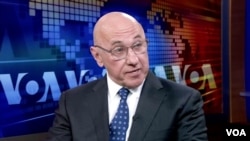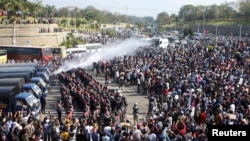In an interview at VOA this week marking the third anniversary of the military coup in Myanmar, Tom Andrews, the U.N. special rapporteur for human rights in Myanmar, spoke about the worsening humanitarian crisis there.
Andrews said the junta continues to strike mainly civilian targets, with Russia standing out as the primary source of weapons. Andrews also spoke about the need for coordination between the U.S. and its allies to impose stronger sanctions on the junta, and the need to find common ground with China to help bring an end to the crisis.
This interview has been edited for length and clarity.
VOA: As many anticipated, the junta has extended the state of emergency, citing the need to continue the fight against what they label as terrorists in the country. How do you interpret the junta's reasoning?
U.N. Special Rapporteur for Myanmar Tom Andrews: They are the terrorists. They are the ones who are engaged in bombing innocent villages. As the conflict continues to heat up and greater conflict engulfs more and more of Myanmar, as they continue to lose ground, lose soldiers, lose weapons, their response is to attack citizens.
I was talking to a military analyst who said that 95% of the military operations engaged by this military are against civilians. So, in my mind, that is the very definition of terrorism — terrorizing and attacking innocent people. Whenever the junta declares an extension of a state of emergency, it says it's doing so to create stability and security for the people of Myanmar. They are, in fact, the source of instability and insecurity for the people of Myanmar.
Of course, this announcement is linked to their idea of trying to create a facade of legitimacy by following the constitution of Myanmar. But it's a farce, and anyone can see that. The fact that elections have been delayed is significant. You cannot have elections under any circumstances under the conditions that we're in right now in Myanmar. You can't expect people to vote while you're bombing their villages.
VOA: In your recent statement on the human rights situation in Myanmar, you emphasized the substantial losses experienced by the military junta in recent months. How has this affected the junta's hold on power, and what challenges are they confronting as a result of these offensives?
Andrews: They are losing ground. They have lost soldiers — more than 4,000 soldiers have been lost, either because they surrendered or defected. They lost commanding generals and literally hundreds of outposts. So, from a military point of view, they are losing. They already had been losing territory, but now the loss of territory is even more significant, and we know that the junta, the military, controls less than half of the country, and those numbers continue to dwindle.
The problem with that from a human rights point of view is that they're responding to those losses by taking advantage of what they do have, which is advanced military weapons, and they're training those advanced military weapons against innocent civilians. So, in the short run, that is a huge problem for the people of Myanmar, even though, in the long run, it's in the interest of the people of Myanmar to see this military junta and its military continue to weaken.
VOA: You've called for U.N. member states to reassess the situation and act urgently. What specific actions do you believe the international community, particularly U.N. member states, should take to address the crisis in Myanmar and save lives?
Andrews: First, the reassessment. The junta has tried to project this idea of inevitability in the international community, saying, "Look, we're here to stay. So just get used to it, accept it, and let's go on from there. Engage with us. You may not like us, but engage with us because we're inevitable." It's very clear they're not. It's very clear that they continue to weaken. So, the first part of the reassessment is to understand that the myth they're trying to perpetrate is just that — it's a myth that simply isn't holding any water. They are not inevitable.
In terms of what we can do as an international community, we start by engaging with and recognizing the legitimate leaders of the country. Secondly, we have to build on what we know is working — sanctions. Targeted sanctions are geared to weakening the capacity of the junta. We know they are working. We know that the junta is having an increasingly difficult time getting access to aviation fuel, for example, to fly those jet fighters over villages dropping bombs. We know that they're losing access to weapons and materials to produce weapons. We know that financial resources are decreasing, so we need to build upon that momentum.
VOA: China has upheld strong ties with the military junta, particularly in joint efforts to suppress cyber-criminal groups. Recently, the junta handed over leaders of the Kokang Border Guards, who were previously under their protection but sought by Chinese authorities. Additionally, China faces accusations of consistently shielding the junta at the United Nations. How could the junta's partnership with China against cybercriminal groups influence the U.N.'s role in Myanmar affairs?
Andrews: It is clear that it is in China's interest to recognize its own security, economic and social interests amidst the evolving situation in Myanmar. Acknowledging the shifting ground in Myanmar and understanding that the military junta is by no means inevitable is crucial. In fact, I would argue that it is the lawlessness being permitted to flourish under this military junta that poses a direct threat to the people of China.
For many reasons, considering China's status as a great nation with significant influence on this crisis, I believe the solution will come through the cooperation and engagement of China. While China may not agree with everything I have to say, I express the truth as I see it and respect their views. On the other hand, within the United Nations, it's worth noting that Kyaw Moe Tun is the representative of Myanmar in the General Assembly and is as strong a critic of the military junta as anyone I know.
The reason he holds that position is because nations like China are supportive. So, I believe that China has shown pragmatism and an acknowledgment of the value of opposition voices, including in the General Assembly. By engaging China in whatever constructive manner possible, I think that is beneficial.
VOA: The U.N. is reporting that the warplanes employed in junta airstrikes are Russian-made, but Russia denied that. How would you evaluate Russia's contribution to providing the junta with essential elements of money, power and legitimacy, as you mentioned?
Andrews: Well, Russia is the single largest source of weapons for the military junta. I don't say that lightly; I've documented it in two major reports issued to the United Nations.
It's deeply unfortunate because these weapons are being used in the most horrific ways. These are helicopter gunships, these are jet fighters with very sophisticated weaponry and bombs, and they're being used against civilians, against innocent villages. That's the tragedy, that's the horror. I was criticized in one of my presentations to the United Nations by Russia for criticizing these weapons transfers.
When I'm being critical, when I'm saying it's unacceptable, I'm referring to the slaughter of innocent people. Providing sophisticated weapons of war to entities that are using those weapons to kill innocent men, women and children is horrific. It means aiding in a horrific situation, a nightmare for the people of Myanmar, and it has to stop.
VOA: In your recent statement, you emphasized the significance of humanitarian aid reaching the most vulnerable, including displaced populations in opposition-controlled areas. Given the complexity of the current situation, what steps can donors and humanitarian agencies take to ensure the effective delivery of aid and support those in need?
Andrews: 18.6 million people are in dire need of humanitarian aid in Myanmar right now. Last year, 10,000 children died of what the United Nations describes as severe acute malnutrition. That means that thousands and thousands of Myanmar children are dying of starvation every year. There's a desperate need for humanitarian aid. We know that the areas controlled by the junta continue to become less and less. We know that the obstacles they put in the way of humanitarian aid in those areas increase.
So we, as an international community, need to take advantage of the vast network of organizations and networks inside the country and operating on the borders that know how to get aid in and get that aid to the people in need. The problem is they just don't have the resources to do this. So I'm encouraging member states of the United Nations to broaden their approach to getting aid out, increase the opportunities for aid going to this network of organizations and provide the funding necessary to address this grave humanitarian crisis that frankly is only getting worse.






